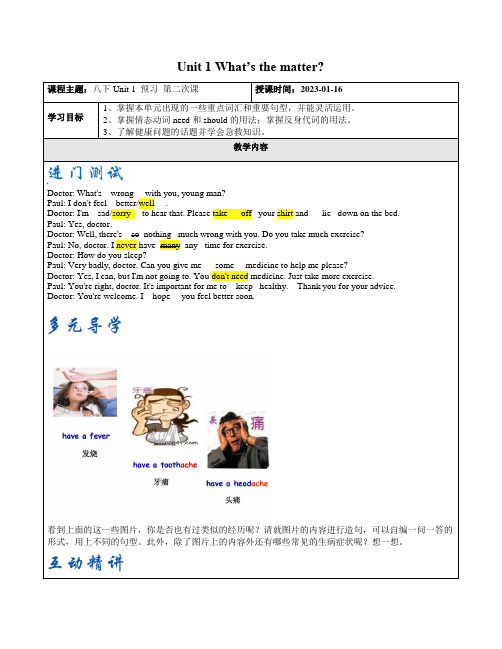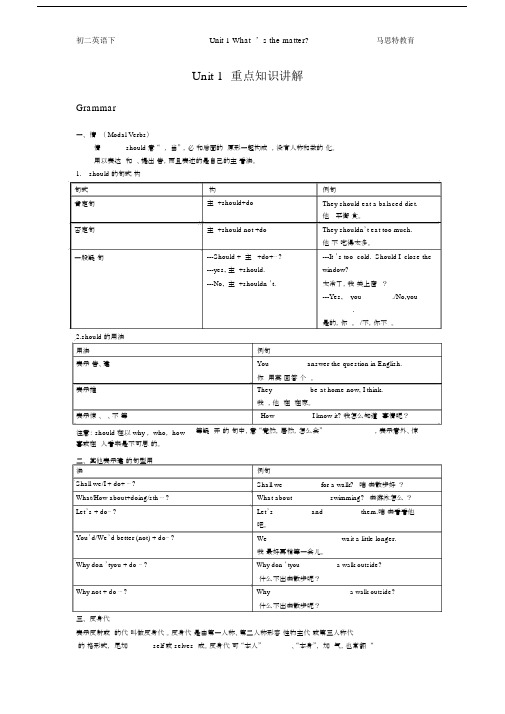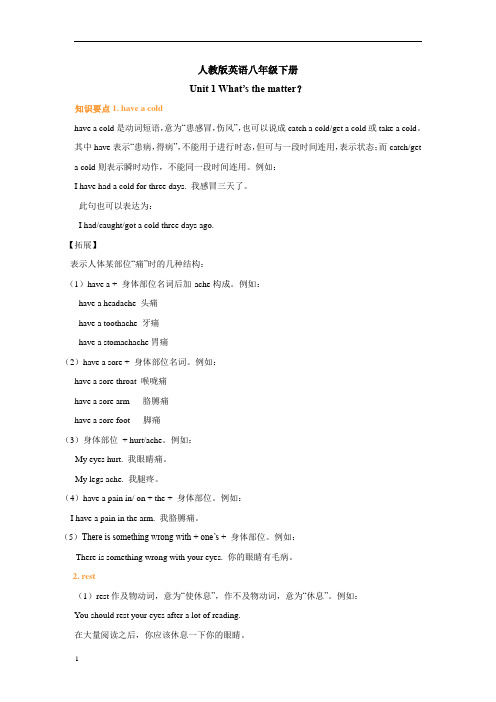人教版英语八年级下册unit1单元讲义(无答案)
2020-2021学年人教版八年级下册英语Unit1复习导学(无答案)

八年级下册英语Unit1复习导学【单元话题】询问健康问题及遇到麻烦的表达方法1. 询问某人患了何种疾病或遇到了何种麻烦时, 常用以下几种结构来表达:What's the matter (with sb. )?(某人)怎么了?What's wrong (with sb. )?(某人)怎么了?What's the trouble (with sb. )?(某人)出什么事了?What happened (to sb. )?(某人)发生了什么事?Are you OK?你没事吧?2. 要表达身体疼痛或不舒服, 可用以下结构:①某人+have/has+病症。
eg:The twins have colds. 双胞胎感冒了。
①某人+have/has+a+身体部位ache。
eg:She had a stomachache last night. 她昨晚肚子痛。
①某人+have/has+a+sore+发病部位。
eg:He has a sore throat. 他喉咙痛。
①某人+hurt(s)+身体部位或反身代词。
eg:He hurt his leg. 他的腿受伤了。
①身体部位+hurt(s).eg:My head hurts badly. 我头疼得厉害。
①There is something wrong with one's+身体部位。
eg:There is something wrong with my right eye. 我的右眼有毛病。
【单元语法】情态动词should的用法1. should为情态动词, 意为“应该;应当”, 否定式为shouldn't, 其后接动词原形, 无人称和数的变化。
常用于表达征询意见、建议、劝告、要求或义务等。
你应该喝加有蜂蜜的开水。
You should drink hot water with honey.2. should用于主语为第一人称的疑问句, 表示征询意见。
最全面人教版八年级下册英语第一单元知识点归纳总结

Unit 1 What's the matter?一、词汇与短语◆重点单词A部分1.matter n. 问题;事情2.sore adj. 疼痛的;酸痛的3.stomachache n. 胃痛;腹痛4.foot n. 脚;足5.neck n. 颈;脖子6.stomach n. 胃;腹部7.throat n. 咽喉;喉咙8.hurt v. (使)疼痛;受伤9.fever n. 发烧10.passenger n. 乘客;旅客11.lie v. 躺;平躺12.break n. 间歇;休息13.rest v. &n. 放松;休息14.onto prep. 向;朝15.X-ray n. X射线;X光16.trouble n. 问题;苦恼17.toothache n. 牙痛18.hit n. (用手或器具)击;打19.headache n. 头痛20.herself pron. (she的反身代词)她自己21.off adv. & prep. 离开(某处);不工作;从……去掉B部分1.bandage n. 绷带v. 用绷带包扎2.press v. 压;挤;按3.sick adj. 生病的;有病的4.knee n. 膝;膝盖5.breathe v. 呼吸6.knife n. 刀7.sunburned adj. 晒伤的8.blood n. 血9.ourselves pron. (we反身代词)我们自己10.mean v. 意思是;打算11.climber n. 登山者;攀登者12.importance n. 重要性;重要13.risk n.&v. 危险;风险;冒险14.decision n. 决定;抉择15.accident n.(交通)事故;意外遭遇16.control v.&n. 限制;约束;管理17.situation n. 情况;状况18.spirit n. 勇气;意志19.kilo( = kilogram) n. 千克;公斤20.death n. 死;死亡21.rock n. 岩石22.nurse n. 护士◆重点短语A部分1.have a cold 感冒2.lie down 躺下3.have a stomachache 胃痛4.take one's temperature 量体温5.have a fever 发烧6.to one's surprise 使……惊讶的是7.get off 下车8.right away 立即;马上9.take breaks (take a break) 休息10.talk too much 说得太多11.drink enough water 喝足够的水12.have a very sore throat 嗓子非常疼13.get an X-ray 拍X光片14.see a dentist 看牙医15.drink some hot tea with honey 喝一些加蜂蜜的热茶16.put some medicine on sth.在……上面敷一些药17.feel very hot 感到很热18.sound like 听起来像19.all weekend 整个周末20.in the same way 以同样的方式21.go to a doctor 看医生22.go along 沿着……走23.on the side of the road 在马路边24.shout for help 大声呼救25.without thinking twice 没有多想26.have a heart problem 有心脏病27.thanks to 多亏了;由于28.in time 及时29.save a life 挽救生命30.get into trouble 陷入麻烦31.hurt oneself 受伤32.fall down落下;摔倒B部分1.be used to 习惯于……;适应于……2.in a difficult situation 在困境中3.take risks (take a risk) 冒险4.keep on doing sth. 继续(或坚持)做某事5.run out (of) 用尽;耗尽6.make a decision 作出决定7.cut off 切除8.get hit on the head 撞到头部9.get out of 离开;从……岀来10.be interested in 对……感兴趣11.give up 放弃12.mean doing sth. 意味着做某事13.put a bandage on sth. 用绷带包扎…14.lose one's life 失去生命15.feel sick 感到恶心16.mountain climbing 登山运动17.have problems breathing 呼吸困难18.be in control of 掌管;管理◆重点句子A部分1.What's the matter with you?=What's the trouble with you?=What's wrong with you?你怎么了?2.What should she do? 她该怎么办呢?3.Did you fall down? 你跌倒了吗?4.Should I take my temperature? 我应该量一下体温吗?5.I think I sat in the same way for too long without moving.我想我以同样的姿势一动不动地坐得太久了。
人教版八年级英语下册Unit 1全单元教学课件(共115张PPT)

matter n. 问题;事情
sore
adj. 疼痛的;酸痛的
have a cold 感冒
stomachache n. 胃痛;腹痛 (stomach)
have a stomachache 胃痛
foot
n. 脚;足
neck n. 脖子
Girl: I _h_a_v_e__a_t_o_o_t_h_a_c_h_e.
Conversation 5 Betty: What’s the matter, Judy?
Ann: She _h__a_s_a__so_r_e__t_h_r_o_a_t.
1c Look at the picture. What are the students’ problems? Make conversations.
2c Make conversations using the information in 2a and
2b.
A: What’s the matter? B: My head feels very hot. A: Maybe you have a fever. B: What should I do? A: You should take your temperature.
break
n. 间歇;休息
hurt (hurt) v. (使)疼痛;受伤
1a Look at the picture. Write the correct
letter [a-m ] for each part of the body.
_h_ arm __e_ back __g_ ear
___ eiye ___ fboot
人教版英语八年级下册单元知识重点复习学案设计(一) Unit1-2 复习(无答案)

人教版英语八年级下册单元重点复习学案(一)Unit1-2Unit1 W hat’s the matter?1. What’s the matter (with you)? 怎么了?出什么事了?也可以用What’s the trouble/ the problem / wrong with sb./ sth.?或者How are you ?2. I had a cold.我感冒了。
用来描述身体状况的词语有以下这些:have a cold=catch a cold=have the flu 感冒have a fever 发热have a cough咳嗽have a stomachache胃疼,肚子疼have a toothache牙疼have a headache头疼have a sore throat 喉咙痛have a sore back 背痛构词法则:身体部位+ache(疼痛)构成新的复合词3. too many+ 可数名词复数,意为太多……too much+ 不可数名词,意为太多……much too+ 形容词/副词,意为太…… (much作为程度副词修饰too)例句:I have too many studennts to teach and too much work to do. That is much too hard.4. enough【形容、副词】足够的/地,enough放在名词前,形容词、副词后。
good enough足够好,enough money=money money5. maybe “或许”,常用于句首,表示可能性,后加句子。
Maybe you are right.may be,是情态动词+be的结构,意为“可能(是),也许(是)”He may be angry.6. sound like+名词代词和从句:It sounds like you don’t know the truth. It sounds like a good idea. sound+形容词,“听起来,好像”,The music sounds nice.7. need 需要,实义动词need+名词,需要某物;need to do sth.需要做某事,表示人主动的动作:You need to listen carefully during class.need doing sth.主语通常是物,表示被动的动作:Your dirty clothes need washing.8.to one’s surprise “使……惊讶的;出乎……意料”,通常用作插入语,放在句首,用逗号与其他部分隔开例:To our surprise, he is our teacher’s son【拓展】①“to one’s + 表示感情色彩的名词(如pleasure, joy, surprise等)意为“令某人……的是”②in surprise惊讶地、惊喜地Bill looked at me in surprise.③be surprise to do sth对做某事感到吃惊be surprised + that从句I was surprised that you took the first place in the race match.look after oneself / take care of oneself 照顾自己teach oneself sth./ learn sth. by oneself自学enjoy oneself 玩得高兴,过得愉快=have fun=have a good timehelp oneself to sth 请自用……(随便吃/喝些……).hurt oneself摔伤自己leave sb. by oneself把某人单独留下一、单项选择( )1.— ?—I have a headache and I don’t feel like eating anything.A. How are you?B. What can I do for youC. What’s the matter with youD. How do you like it( )2. –Why are you so tired these days? --Well, I have ______ homework to doA. too muchB. too manyC. much tooD. many too( )3. Now, some robots are _______ to do the same things ______ peopleA. enough smart; asB. enough smart; forC. smart enough; asD. smart enough; with( )4. Don’t ______ the bus until it has stoppedA. get alongB. get toC. get offD. get up( )5. ______ our surprise, the twin sisters went to Peking University at the same times last year.A. withB. inC. toD.for( )6. Those girls enjoyed ____ in the party last night.A. themB. theyC. themselvesD. herself( )7. Help ____ to some fish, children.A. yourselfB. yourC. yoursD. yourselves( )8. Not only the young but also the old are getting interested _____ WeChat (微信)A. byB. aboutC. inD. for( )9. –Who teaches ____ math? –I teach ______.A. your, myselfB. you, myselfC. you, meD. you, herself( )10. Luckily, he didn’t hurt ____ terribly yesterday.A. himB. themselvesC. himselfD. they二、用合适的反身代词填空:11. Bad luck! I cut _________ with a knife yesterday.12. They tell us they can look after________ _ very well.13. My cat can find food by_________ .15. Help __________to some beef, boys.16. Bill wants to teach_________ French from now on.17. Jenny enjoyed_________ in the park yesterday afternoon.18. Xiao Hui, can you introduce _________ to us ?Unit 2 I’ll help to clean up the city parks1.volunteer:v.自愿(做某事)volunteer to do sth. volunteer for sth.n. 志愿者adj. 志愿的;自愿的 a volunteer job2.疑问词+动词不定式=宾语从句I really can’t decide where I should go.=I really can’t decide where to go.3.such+a(n) +形容词+名词=so+形容词+a(n)+名词She is such a beautiful girl.=She is so beautiful a girl.4.satisfaction(n.满意)--satisfy(v.使满意)--satisfied(adj.满意的)--satisfying(令人满意的)to one’s satisfaction使/令某人满意/满足be satisfied with对......感到满意be satisfied to do sth. 对做某事感到满意5. raise【动词】举起;提高;募集;抚养raise money集资,筹钱;raise money for…为……筹钱;raise three children 抚养三个孩子6. make it possible (for sb.) to do sth.使(某人)做某事成为可能You helped to make it possible for me to have Lucky.【重点句型】make it +形容词(+for sb.) to do sth. 使(某人)做某事成为…;think/find it +形容词to do sth.make a difference to…对……有影响;对……起作用,difference前可以用no, any, some, much等修饰,如The rain made no difference to the game.Hard-working makes much difference to study.7. imagine: (1)imagine doing sth.想象做某事(2)imagine sb. to do sth.想象某人做某事(3)imagine that/what 想象......8. train: v. 训练n. 火车training n.训练;培训(1)train sb./sth. to do sth.训练某人/某物去做某事(2)train sb. in sth. 在某方面训练/培养某人9. understand=follow=catch理解;听懂understanding adj.善解人意的;体谅人的10. change v. 改变;变化change one’s life change...into...n. 零钱(不可数名词)改变(可数名词changes)11.短语加油站:cheer up (使)变得高兴;振奋起来give out分发;散发come up with想出;提出put off推迟hand out分发call up打电话给某人;征召care for照顾;非常喜欢try out 参加.....选拔;试用fix up修理;装饰give away赠送;捐赠(1)做主语To clean streets is my job/My job is to clean streets.(2)做宾语She wants to wear the new skirt.(3)做宾语补足语Teachers tell us not to play football in the streets.(4)做定语Today I have so much work to finish.(5)做目的状语Many young people go to big cities to look for jobs.(6)做原因状语I am happy to see you.(7)固定句型It is +adj for sb to do sth.Sb.find(feel,think,believe) it + adj + to do sth.(8)特殊疑问词what/ where/when/how……+ to do 组成名词性短语。
Unit1What’sthematter辅导讲义2人教版八年级英语下册

Unit 1 What’s the matter?Doctor: What's__wrong__ with you, young man?Paul: I don't feel__better/well__ .Doctor: I'm__sad/sorry__ to hear that. Please take___off_ your shirt and___lie_ down on the bed.Paul: Yes, doctor.Doctor: Well, there's__so_nothing_ much wrong with you. Do you take much exercise?Paul: No, doctor. I never have_many_any_ time for exercise.Doctor: How do you sleep?Paul: Very badly, doctor. Can you give me___some__ medicine to help me please?Doctor: Yes, I can, but I'm not going to. You don't need medicine. Just take more exercise.Paul: You're right, doctor. It's important for me to__keep_ healthy. Thank you for your advice.Doctor: You're welcome. I__hope__ you feel better soon.看到上面的这一些图片,你是否也有过类似的经历呢?请就图片的内容进行造句,可以自编一问一答的形式,用上不同的句型。
此外,除了图片上的内容外还有哪些常见的生病症状呢?想一想。
人教版八年级下册英语Unit1知识点(K12教育文档)

人教版八年级下册英语Unit1知识点(word版可编辑修改)编辑整理:尊敬的读者朋友们:这里是精品文档编辑中心,本文档内容是由我和我的同事精心编辑整理后发布的,发布之前我们对文中内容进行仔细校对,但是难免会有疏漏的地方,但是任然希望(人教版八年级下册英语Unit1知识点(word版可编辑修改))的内容能够给您的工作和学习带来便利。
同时也真诚的希望收到您的建议和反馈,这将是我们进步的源泉,前进的动力。
本文可编辑可修改,如果觉得对您有帮助请收藏以便随时查阅,最后祝您生活愉快业绩进步,以下为人教版八年级下册英语Unit1知识点(word版可编辑修改)的全部内容。
Unit1 What's the matter? 名词:matter 问题;事情stomachache 胃痛;腹痛stomach 胃;腹部foot 脚;足neck 颈;脖子throat 咽喉;喉咙fever 发烧X—ray X射线;X光toothache 牙痛headache 头痛break 间歇;休息passenger 乘客;旅客trouble 问题;苦恼knee 膝盖climber 登山者;攀登者situation 情况;状况kilo(=kilometer)千克;公斤rock 岩石knife 刀blood 血importance 重要性;重要decision 决定;抉择spirit 勇气;意志death 死亡nurse 护士动词:lie 躺;平躺hurt (使)疼痛;受伤hit (用手或器具)击;打mean 意思是;打算;意欲形容词:sick 生病的;有病的sore 疼痛的;酸痛的代词:herself 她自己ourselves 我们自己介词:onto 向;朝兼类词:rest v&n 放松;休息cough n&v 咳嗽risk n&v 危险;风险;冒险control n&v 限制;约束;管理off adv&prep 离开(某处);不工作;从…去掉短语:have a cold 感冒have a stomachache 胃痛have a fever 发烧lie down 躺下take one’s temperature 量体温take breaks=take a break 休息get off 下车get on 上车to one’s surprise 使……惊讶的是right away 立即;马上get into 陷入;参与take risks=take a risk 冒险run out(of)用尽;耗尽cut off 切除get out of 离开;从……出来be in control of 掌握;管理give up 放弃be used to doing sth 习惯于…;适应于…used to do sth 过去常常做某事知识点:1、What's the matter?怎么了?What's the matter with sb?某人怎么了?询问某人或周围发生了什么事情=What’s wrong?=What's the trouble/problem?例:—What's the matter?—I have a cold。
人教八年级下册Unit-1知识点详解(K12教育文档)

(完整word版)人教八年级下册Unit-1知识点详解(word版可编辑修改) 编辑整理:尊敬的读者朋友们:这里是精品文档编辑中心,本文档内容是由我和我的同事精心编辑整理后发布的,发布之前我们对文中内容进行仔细校对,但是难免会有疏漏的地方,但是任然希望((完整word版)人教八年级下册Unit-1知识点详解(word版可编辑修改))的内容能够给您的工作和学习带来便利。
同时也真诚的希望收到您的建议和反馈,这将是我们进步的源泉,前进的动力。
本文可编辑可修改,如果觉得对您有帮助请收藏以便随时查阅,最后祝您生活愉快业绩进步,以下为(完整word版)人教八年级下册Unit-1知识点详解(word版可编辑修改)的全部内容。
unit 11. What’s the matter (with you)?怎么了?出什么事了?What’s the trouble/ the problem / wrong with sb。
/ sth.? = What’s up? = What happens to sb.?【注】:matter 和trouble 为名词, 其前可加the 或形容词性物主代词, wrong 是adj。
不能加the.【习】:—What’s the matter ______ Tom. He is wet through. —His car ran _______ the river。
A.with; in B。
to; into C.with; into【拓展】matter的用法(1) It doesn't matter 没关系(用来回答别人道歉时的用语)【习】:—I’m very sorry. I broke your tea cup. —__________.A. It doesn’t matterB. You’d better notC. Take it easy D。
It’s too bad (2) as a matter of fact= in fact 事实上,实际上2.I had a cold. 我感冒了。
人教版八年级下册英语Unit1(第一单元)优秀教案

Unit 1 What's the matter?第一课时Section A (1a2d)【教学目标】1.重点单词:matter,back,sore,throat,stomachache,foot,neck,stomach,fever,lie,rest,cough,Xray,toothache,headache2 重点短语:have a sore throat,have a stomachache,have a cold,lie down,take one's temperature,have a fever,go to a doctor3 重点句式:—What's the matter?—She talked too much yesterday and didn't drink enough water.She has a very sore throat now.You should drink some hot tea with honey.It doesn't sound like you have a fever.You need to take breaks away from the computer.I think I sat in the same way for too long without moving.If your head and neck still hurt tomorrow,then go to a doctor.【学习重点】1 重点短语和句型2 询问对方身体状况的句型及答语【学习难点】询问对方身体状况的句型及答语【自主学习】一、预习课本P12新单词并背诵,完成下面的汉译英。
1 问题____________ 2.背部____________3 疼痛的____________ 4.嗓子____________5 胃痛____________ 6.脚____________7 脖子____________ 8.胃____________9 发烧____________ 10.平躺____________11 休息____________ 12.咳嗽____________13 X光____________ 14.牙疼____________15 头疼____________二、认真预习1a2d找出下列短语和句型。
八下英语第一单元课件人教版

八下英语第一单元课件人教版The problem is that I am unable to provide the specific English language courseware for the 8th grade, Unit 1, from the People's Education Press. However, I can discuss the general requirements and objectives of an English language course for 8th graders and the potential challenges that students may face in learning English at this level.In an 8th-grade English language course, students are typically expected to build on the foundational skills they have acquired in previous years and to further developtheir proficiency in reading, writing, speaking, and listening. The course may focus on expanding vocabulary, improving grammar and syntax, and enhancing comprehension and communication skills. Additionally, students may be introduced to more complex literary texts and be encouraged to analyze and interpret them critically.One potential challenge for students at this level is the increasing complexity of the English language. As theyprogress through their studies, students are likely to encounter more advanced vocabulary, intricate grammatical structures, and nuanced literary themes. This can be overwhelming for some students, especially those who may struggle with language acquisition or have learning differences.Furthermore, the demands of the course may require students to engage with English language materials that are culturally and contextually unfamiliar to them. This can present a barrier to comprehension and may require additional support and guidance from teachers.Another challenge for 8th-grade English language learners is the development of effective communication skills. As they navigate the complexities of the English language, students may find it challenging to express themselves clearly and coherently, particularly in spoken communication. Additionally, they may struggle with understanding and interpreting the perspectives and intentions of others in English-language interactions.In addition to the academic challenges, 8th-grade students may also face social and emotional obstacles in their English language learning. They may feel self-conscious about making mistakes or speaking in front of their peers, which can hinder their confidence and willingness to participate actively in class activities.Despite these challenges, 8th-grade English language learners have the potential to make significant strides in their language proficiency and to develop a deeper appreciation for the English language and its cultural significance. With the support of dedicated teachers, engaging course materials, and a supportive learning environment, students can overcome these obstacles and achieve success in their English language studies.。
Unit 1 单元知识点总结课件--八年级英语下册(人教版)

02 作表语
描述身体/精神状态或感觉
常放be, feel, seem, look…后
You can be yourself.
03 作同位语
强调作用, 常作主语或宾语 的同位语, 表示“亲自,本人” The story itself is good. .
02
(die- died- died- dying)
She died 2 years ago.
04 dying adj. 垂死的,要死的
This is a dying bird.
2.7 risk
n. 危险,风险
the risk of … …的风险 Staying up will increase the risk of the illness.
lie down and rest / shouldn’t eat so much next time
④ have a toothache
see a dentist and get an X-ray
⑤ have a fever
take one’s temperature
⑥ have a headache
Words
matter, lie, enough, mean…
2.1 matter
n. 问题,事情
-- What’s the matter with you? -- I hurt my leg.
v. 要紧,有关系
It doesn’t matter.
2.2 enough
位置:前形副后
adj. 足够的,充足的 enough + n I have enough money.
人教版八年级英语下册Unit1单元说课稿

1.知识与技能:学生能够掌握一般过去时的构成和用法,能够正确回答关于假期活动的一般过去时疑问句和否定句,学会使用常用过去式动词描述过去发生的事情。
2.过程与方法:通过小组合作、角色扮演等活动,提高学生的听说读写能力,培养学生的语言运用能力和合作精神。
3.情感态度与价值观:通过讨论假期活动,激发学生的学习兴趣,培养学生积极的学习态度,增强学生对英语学习的自信心。
(二)学习障碍
在学习本节课之前,学生需要掌握一定的一般现在时知识,以及基本的疑问句和否定句结构。他们可能存在的学习障碍主要有:对过去时态的理解和运用,尤其是在疑问句和否定句中的运用。此外,对于一些常用过去式动词的掌握度不高,以及如何在实际语境中正确运用过去时态。
(三)学习动机
为了激发学生的学习兴趣和动机,我将采取以下策略或活动:首先,通过引入与学生生活紧密相关的话题,如假期旅游,引发他们的兴趣和共鸣。其次,设计丰富的课堂活动,如小组讨论、角色扮演等,让学生在实践中学习和运用知识。再次,设置合理的教学目标,让学生在学习过程中感受到进步和成就感。最后,注重鼓励和表扬,让学生充分感受到学习的乐趣和自信。
四、教学过程设计
(一)导入新课
为了快速吸引学生的注意力和兴趣,我将以提问方式导入新课。首先,我会问学生:“你们最喜欢的假期活动是什么?”让学生分享他们的假期经历。然后,我会展示一张假期旅游的图片,并问学生:“这张图片是在哪里拍摄的?你们是怎么去的?”通过这个问题,我可以引出本节课的主题——过去时态。接下来,我会告诉学生,今天我们将学习如何用英语描述过去发生的事情。
(二)媒体资源
我将使用多媒体课件、网络资源和实物教具来辅助教学。多媒体课件可以直观地展示过去时态的结构和用法,帮助学生更好地理解和记忆;网络资源可以提供更多的实际语境和练习题,让学生在课后进行自主学习;实物教具如图片、地图等可以让学生更直观地了解假期活动的地点和交通方式。这些资源的作用是丰富教学内容,提高学生的学习兴趣和参与度。
(完整版)人教版八年级英语下册Unit1知识点讲解.doc

初二英语下Unit 1 What ’s the matter?马思特教育Unit 1 重点知识讲解Grammar一、情( Modal Verbs)情should 意“ ,当” ,必和后面的原形一起构成,没有人称和数的化。
用以表达和、提出告,而且表述的是自己的主看法。
1.should 的句式构句式构例句肯定句主 +should+do They should eat a balaced diet.他平衡食。
否定句主 +should not +do They shouldn’t eat too much.他不吃得太多。
一般疑句---Should + 主 +do+⋯ ? ---It ’s too cold. Should I close the---yes, 主 +should. window?---No, 主 +shouldn ’t. 太冷了,我关上窗?---Yes, you ______./No,you________.是的,你。
/不,你不。
2.should 的用法用法例句表示告、建You _________ answer the question in English.你用英回答个。
表示推表示惊、、不等注意: should 在以 why , who, how 喜或在人看来是不可思的。
二、其他表示建的句型用法Shall we/I + do+ ⋯ ?What/How about+doing/sth ⋯ ? Let’s + do⋯ ?You’d/We’d better (not) + do⋯ ?They _________ be at home now, I think.我,他在在家。
How _________ I know it? 我怎么知道事情呢?等疑开的句中,意“竟然,居然,怎么会”,表示意外、惊例句Shall we _________ for a walk?咱去散步好?What about _________ swimming?去游泳怎么?Let’s _________ and _________ them.咱去看看他吧。
初中英语说课稿八年级下第一单元

初中英语说课稿八年级下第一单元English: In this lesson, we will be focusing on the first unit of the eighth-grade English curriculum, which is about festivals around the world. The goal of this lesson is to introduce students to different cultures and traditions through the celebration of various festivals. The lesson will begin with an introduction to the topic, followed by a warm-up activity to engage students and activate their prior knowledge. Next, we will explore different festivals such as Chinese New Year, Thanksgiving, and Diwali, highlighting the customs, foods, and activities associated with each celebration. Through group discussions and collaborative activities, students will have the opportunity to share their own experiences and learn from their peers. The lesson will conclude with a reflection on the importance of cultural diversity and the significance of festivals in bringing people together.中文翻译: 在这节课上,我们将关注八年级英语课程的第一个单元,该单元是关于世界各地的节日。
人教版英语八年级下册Unit1知识点和练习(无答案)

人教版英语八年级下册Unit 1 What’s the matter?知识要点1. have a coldhave a cold是动词短语,意为“患感冒,伤风”,也可以说成catch a cold/get a cold或take a cold。
其中have表示“患病,得病”,不能用于进行时态,但可与一段时间连用,表示状态;而catch/geta cold则表示瞬时动作,不能同一段时间连用。
例如:I have had a cold for three days. 我感冒三天了。
此句也可以表达为:I had/caught/got a cold three days ago.【拓展】表示人体某部位“痛”时的几种结构:(1)have a + 身体部位名词后加-ache构成。
例如:have a headache 头痛have a toothache 牙痛have a stomachache胃痛(2)have a sore + 身体部位名词。
例如:have a sore throat 喉咙痛have a sore arm 胳膊痛have a sore foot 脚痛(3)身体部位+ hurt/ache。
例如:My eyes hurt. 我眼睛痛。
My legs ache. 我腿疼。
(4)have a pain in/ on + the + 身体部位。
例如:I have a pain in the arm. 我胳膊痛。
(5)There is something wrong with + one’s + 身体部位。
例如:There is something wrong with your eyes. 你的眼睛有毛病。
2. rest(1)rest作及物动词,意为“使休息”,作不及物动词,意为“休息”。
例如:You should rest your eyes after a lot of reading.在大量阅读之后,你应该休息一下你的眼睛。
人教版八年级下册英语第一单元课件

Fun time: WhTaatswk2il:l your life be like in
10 years?
Education (school, computer, exams, learning method) Family life (food, clothes, chores, entertainment) …
1a: 语法 Learn a Sentence Structure — will + do 1. The backpack will carry you. 2. Cars will always have to stop for stop
signs. 3. The computer will punish you. 4. You will be able to drive to another
人教版八年级下册英语第 一单元课件
Period 1
Section A—1a~1c
1a:导入 Brainstorm all kinds of predictions in 2 minutes.(There are 4 people in a group.)
school life
daily life
science
future world
city…
Write down the predictions that most likely happen.
• There will / won’t be … • People will / won’t … • Kids …
Let’s predict our future! robot
There will be less pollution in the future.
人教版英语八年级下册 Unit 1 语法--反身代词 学案 (无答案)

人教八年级unit1语法--反身代词讲解及练习反身代词反身代词又称为自身代词,表示动作行为反射到行为执行者本身。
它还可以在句中起到强调的作用,用以加强语气。
英语中共有八个反身代词,在使用时应注意和它所指的相应的对象在人称、性别、数上保持一致。
其基本形式如下表所示:1. 可用作宾语,指的是宾语和主语表示同一个或同一些的人或事物。
如:Maria bought herself a scarf.玛丽亚给自己买了一条围巾。
We must look after ourselves very well.我们必须好好照顾自己。
2. 可用作表语,指的是表语和主语表示同一个或同一些人或事物。
如:She isn’t quite herself today.她今天身体不太舒服。
3. 可用作主语或宾语的同位语,常用来加强语气。
如:She herself will fly to London tomorrow.明天她自己将要坐飞机去伦敦。
I met the writer himself last week.我上周见到了那位作家本人。
4. 用在某些固定短语当中。
照顾自己look after oneself / take care of oneself自学teach oneself sth./ learn sth. by oneself玩得高兴,过得愉快enjoy oneself请自用……(随便吃/喝些……)help oneself to sth.摔伤……hurt oneself【温馨提醒】1. 反身代词不能单独做主语,但可以做主语的同位语,起强调作用。
如:我自己能完成作业。
I myself can finish my homework. /I can finish my homework myself.2. 反身代词表示“某人自己”,不能表示“某人的东西”,因为它没有所有格的形式。
表达“某人自己的(东西)”时,须要用one’s own.如:我用我自己的蜡笔画画。
- 1、下载文档前请自行甄别文档内容的完整性,平台不提供额外的编辑、内容补充、找答案等附加服务。
- 2、"仅部分预览"的文档,不可在线预览部分如存在完整性等问题,可反馈申请退款(可完整预览的文档不适用该条件!)。
- 3、如文档侵犯您的权益,请联系客服反馈,我们会尽快为您处理(人工客服工作时间:9:00-18:30)。
人教版英语八年级下册Unit 1 What’s the matter?第一部分:重点语法讲解:1. Should 用法:should 是情态动词词,意思是“应该,应当”表示劝告,建议或命令。
没有人称和数的变化形式,后面接动词原形。
(1)You should drink much water.(2)否定句: You should not drink much water.(3)—It’s cold outside. Should I close the window?—Yes, you should. No, you should not.2. 我们学到的用英语提建议的句型还有:(1) Shall I /we +do sth ?(2) Let’s do sth.(3) What/how about doing sth?(4) Why not do sth= Why don’t you do sth ?(5) You’d/ we’d better (not )do sth?3. 跟踪练习题一.单项选择:1. —_________ we go to visit the Great Wall tomorrow?—Good idea.A. ShallB. WillC. MustD. May2. Let’s __________ a party this Sunday at school.A. to haveB. haveC. havingD. had3. What __________helping her with her English?A. toB. ofC. aboutD. finish4. Why not ___________ your homework on time?A. to finishB. finishingC. finishedD. finish5. If you have a headache, I think you __________ see a doctor.A. willB. shallC. shouldD. can二.按要求改写句子,每空一词。
1. You shouldn’t eat anything for 24 hours. (改为同义句)You ___________ eat ____________ for 24 hours.2. You’d better ask for her help. (改为否定句)You’d better _____________ ___________ her for help.3. She should stay in bed for a day or two. (就划线部分提问)____________ ___________ she _____________?第二部分:课文重点内容讲解Section AWhat’s the matter?1.matter名词:“问题,事情”I have a matter to discuss with you.动词:“要紧,关系重大”It doesn’t matter.中考—I am sorry. I broke your tea cup.—___________.A. It doesn’t matterB. You’d better notC. Take it easyD. I t’s too bad2. What’s the matter? 常用来询问某人患了何种疾病或遇到了什么麻烦等,其后可以接with sb/sth.What the matter with Mary? =Wha t’s wrong with you? =What’s the trouble with you? trouble 前可以加the 或形容词性物主代词,wrong前不加任何修饰词。
中考—__________?—I have a headache and I don’t feel like eating anything.A. How are youB. What can I do for youC. What’s the matter with youD. How do you like itI have a cold.1. have 实意动词“吃,喝”2.“have +a/an +表示生病的名词”意为:“得了……病”have a fever, have a cough, have a headache, have a sore throat注意: have a cold 和catch a cold, get a cold, take a cold “都可以用来表示伤风,感冒”have a cold 表示“感冒”的状态,与一段时间连用,而catch/ get/ take 都表示瞬间动作,不能与时间段连用。
eg:—How long have you had a cold?—I have had a cold for six days. (T)—How long have you caught a cold? (F)I have a sore back.1. 表达“疼痛”的办法:(1). have a sore +身体部位I have a sore leg.(2). have a +身体部位+ache She has a toothache.(3). have a +病症I have a cold.(4). 身体部位+hurt(s) His hands hurts badly.(5). have a pain in /on the +身体部位I have a pain in the arm.2. ache 和sore 区别(1) ache 名词,通常指连续的,局部的疼痛。
常与表示身体部位的名词合成一个新词,表示“……疼痛”。
Mary has a headache.(2) sore 形容词,意为:“疼的,痛苦的”常放在表示身体部位的名词前,与其构成名词短语。
I have a sore throat.Foot1.名词,脚,复数形式是:feet. A dog has four feet.2.名词,英尺。
This fish is one foot long.3.名词,底部。
At the foot of …在……底部The village is at the foot of the mountain. She talked too much yesterday and didn’t drink enough water.1. too much 和much too 区别(1) too much 的中心词是much, 用法与much 同。
①做形容词,意思是“太多”,修饰不可数名词。
You eat too much meat today.②做代词,意思是:“太多(……)代替前面提到过的不可数名词。
I’m sorry I have to now.I have too much to do at home.③做副词,修饰动词(如talk, thank, walk, work等)放在这些词的后面或者是放在这些词的宾语的后面做状语, 意思是“过分,太”。
My parents always worry about me too much. You talked too much.(2)much too 的中心词是too, 用法与too相同,用来修饰形容词或者是副词的原级。
eg:The coat is much too expensive. I can’t afford it.He walked much too fast. I couldn’t keep up with him at all.中考:—The meat is __________ delicious.—Yes, but don’t eat __________.A. too much, too muchB. much too; too muchC. too much; much tooD. much too; much too2. enough, 在这里是形容词,“足够的”修饰名词water.enough 还可以做副词,“足够地”My son is old enough to go to school.enough, 还可以做代词“足够”I have had enough, thank you.注意:enough 做副词时,总是要放在被修饰词的后面;做形容词修饰名词时,可以放在名词前面也可以放在名词后面。
enough 修饰形容词或者是副词一定要后置。
中考:—How do you like the talk show?—I think it’s _________, but some people think it’s so __________.A. wonderful enough; boredB. enough wonderful; boringC. wonderful enough; boringD. enough wonderful; boringLie down and rest.1.lie 做“躺,躺下;位于”讲时是不规则动词。
另外lie 做“撒谎,说谎”讲时,为规eg: The boy who lay there just now told a lie. He lied that his school lay in the north of the city. (规则的说谎,不规则的躺。
中考: Isn’t it strange that the cat is used to ________(lie) beside the dog peacefully?2. rest(1) 名词,“休息”have a rest I had a good rest last night.(2) 动词,“休息,放松”The doctor told me to rest.Drink some hot tea with honey.with 是一个介词,意思是“有,带有”China is a country with long history.with 还有以下几种用法(1)“用,”表示使用某种工具或手段等。
She is writing with a pen.(2)“和……在一起”表示陪伴。
Can you go with me?(3)“随着,与……同时”The shadow moves with the sun.(4)“有,带有,具有”a girl with red hair中考:—I’d like a cup of black coffee. What about you, Maggie?—I prefer coffee _________ sugar.A. thanB. forC. withD. toMy head feel very hot.feel, 感官动词Maybe you have a fever.maybe 和maybe 区别You need to take breaks away from the computer.1. need 用法2. take breaks 相当于take a break 或者是have a break.At 9:00 a.m. yesterday, bus No. 26 was going along Zhonghua Road when the driver saw an old man lying on the side of the road.See sb do sth “看见某人做过某事”强调看见事情发生的全过程,表示动作的完整性和真实性。
